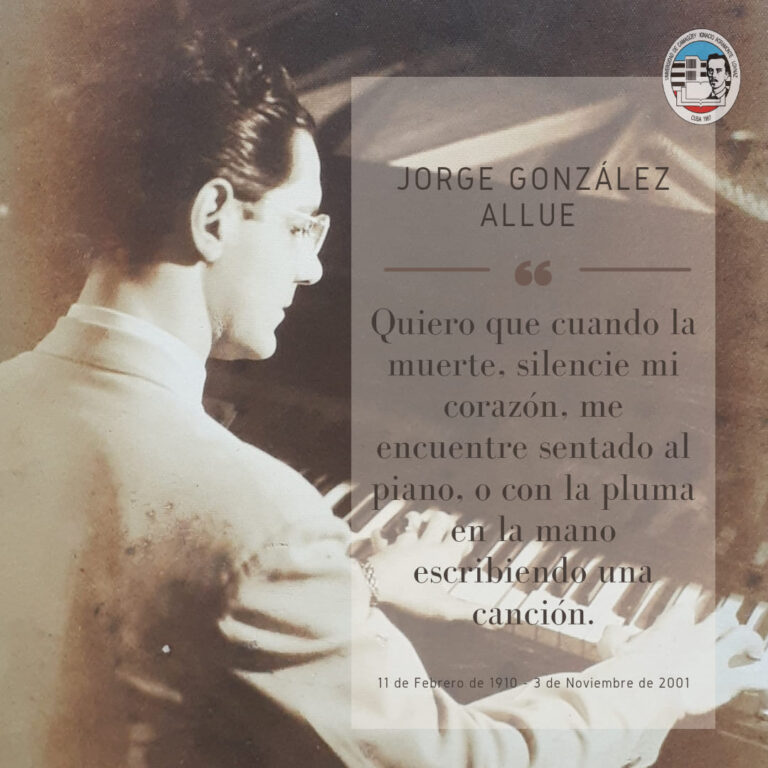![]()
The text is the result of an incessant and laborious search for information in magazines, newspapers, legal and private documents that, with pleasant, fresh and profound language, synthesizes, in more than 100 pages, with lavish confidence, the life and work of the notable creator

Camagüey, Cuba, Sep 24th.- The last of the greats, by Oscar R. Viñas Ortiz, reaches readers in its third edition, corrected and expanded, taken over by Editorial D’ McPherson. It is a testimony about the life and work of the prestigious pianist and composer from Camagüey Jorge González Allué (1910-2001), one of the illustrious figures in Cuban and Latin American musical history.
Structured in 21 essential aspects, Viñas Ortiz obtains from Allué interesting confidences about his intimate life, memories and personal feelings never revealed by the composer of the song Amorosa guajira, a musical work that transcends its time.
“In my songs, the theme is love. Source of inexhaustible works. «Full, satisfied love, love indisputably linked to pain…», the maestro asserted to his interlocutor.
Precisely in July 1937, Allué wrote the Guajira sentimental, the most international of his musical works, shortly after called Amorosa guajira and which appears registered under both titles.
With more than eight decades of creation, it is a composition that only comes from the thought of a genius: “Come, loving guajira / that nothing inspires me anymore / not even the song of the bird / that furrows love. / Come, brighten my hut / that even the bed of the river / has become gloomy / because you are missing.
In the early 1940s, the song was purchased by a United States publisher, but he never received royalties for the recordings abroad.
Only with that investigative passion and without prejudice was Viñas able to delve into the life of the composer, who expressed what he felt “with the sincerity and ease that his 91 years and the experiences he had lived allowed him.”
They were conversations that often exceeded twelve hours, “weaving together memories and dealing with increasingly interesting aspects, then a little more personal, and finally I found the intimacy of a life dedicated to love and the piano.”
The text is the result of an incessant and laborious search for information in magazines, newspapers, legal and private documents that, with pleasant, fresh and profound language, synthesizes, in more than 100 pages, with lavish confidence, the life and work of the notable creator.
It brilliantly narrates memories, many unpublished, of Allué‘s childhood and youth that make the hearts of those who read The Last of the Greats beat, the first edition of which was published by Editorial Ácana in 2010 and which was sold out in bookstores, in just under a month.
“I learned to read and write before going to school, in my own home, taught by my great aunt Caridad Vázquez Socarrás, whom I consider like a second mother,” Allué tells Viñas Ortiz.
Now published in a publishing house with international reach, readers have a text that externalizes evidence that harmonizes a society “that we did not know, but very rich in interesting and fun anecdotes, which are part of the history of Camagüey at the beginning of the 20th century.” , according to Oscar Ramón Viñas Ortiz, also author of the memoirs Cuban Speakers for Unity in the Americas, Editorial En Vivo 2019.
Viñas, evidence that the musician had close ties with the teachers Ernesto Lecuona and Ignacio Villa (Bola de Nieve).
Of Lecuona, whom he met in Pinar del Rio in 1931, he stated: “For me, the greatest that Cuba has given (…) Every time Lecuona came to Camagüey I went to greet him. “He said that I was the only Camagüeyan who knew how to laugh.”
The exciting testimony The Last of the Greats is, likewise, a dialogue between the author and the protagonist. It also considers fascinating stories of one of the most notable Cuban composers of the 20th century, who at only three years old showed interest in art. He wrote almost 400 works, including poems, stories, testimonies and a lyrical comedy.
“I believe that life only gives us what we were able to conquer with intelligence and sacrifice,” explains the talented prince.
The complete musical work, the archives, photographs and autographed letters of Allué and of great personalities with whom he had close contact were donated to the Julio Antonio Mella Provincial Library, in the Ciudad de los Tinajones.
In 1990, the provincial executive of Popular Power granted him the title of Illustrious Son of Camagüey in the context of his 80th birthday.
Allué advanced his words for the epitaph when he wrote: “I want, when death silences my heart, to find myself sitting at the piano or with a pen in my hand, writing a song.”
On November 3rd, 2001, at the age of 91, the composer of Amorosa guajira physically ceased to exist and immersed himself in clouds of lyricism to go in search of posterity.
He died as he wanted, “sleeping eternal sleep and with the satisfaction of fulfilling his duty reflected in his face. Just as I had expressed to him two days before, when I went to visit him.”
Jorge González Allué, is the last of the greats, as stated in the title of this work that Oscar Viñas Ortiz puts in the hands of readers, a reflection on the intimate life, memories and personal feelings never revealed by the pianist and composer.
This work can be purchased at https://www.amazon.com/dp/B0CJ2Y81X3
By Lázaro David Najarro Pujol/Contributor